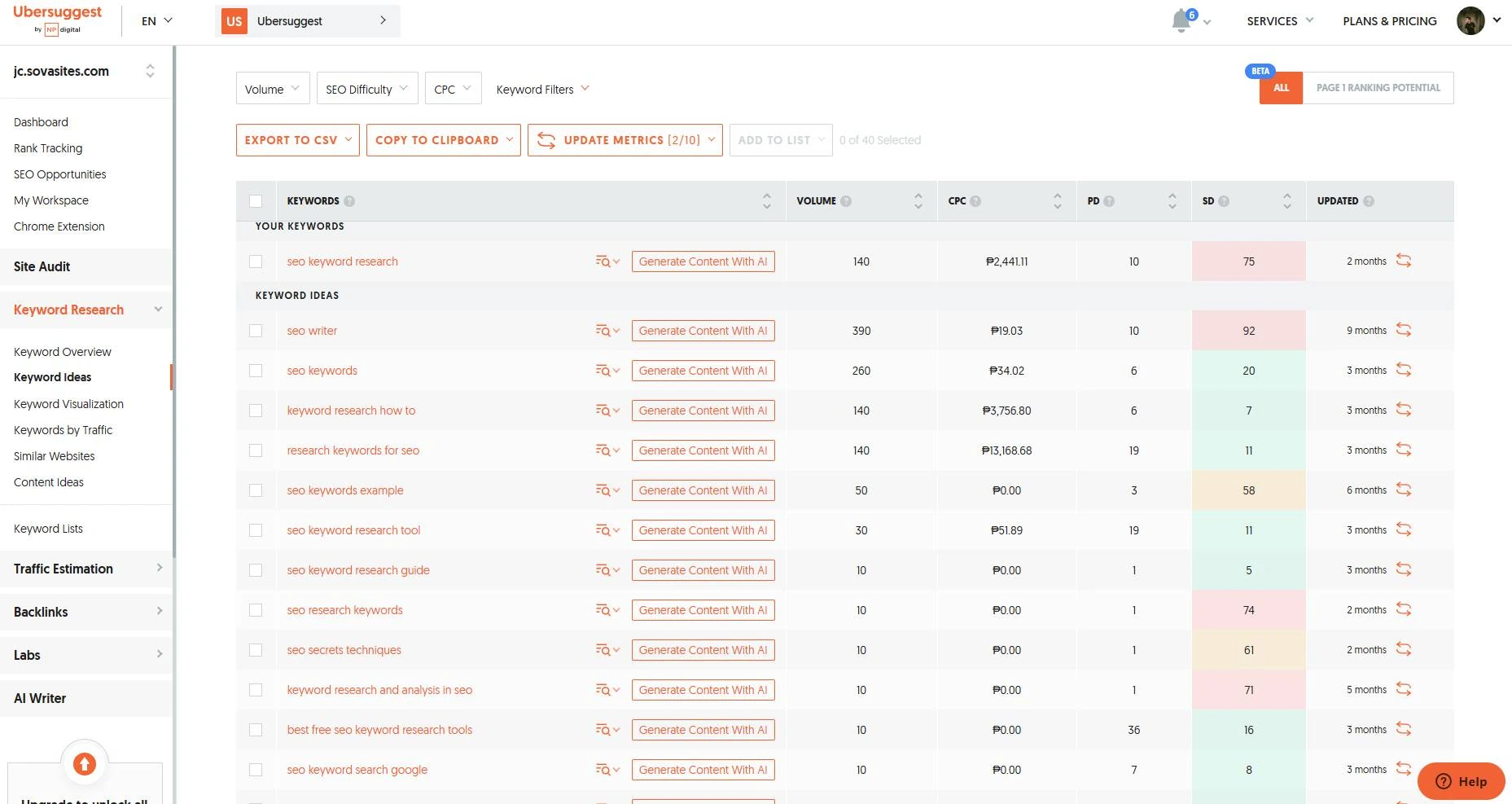SERVICES
KEYWORD RESEARCH FOR SEO
Keyword Research: What It Is and Why It Matters
Keyword research is the process of identifying and analyzing the terms and phrases that users enter into search engines when looking for information, products, or services. This essential practice helps you understand what potential customers are searching for, allowing you to tailor your content and optimize your website to meet their needs.
When I dive into keyword research, I primarily use Ubersuggest because it provides valuable insights into what users are searching for. I love exploring different keywords and phrases to understand their search volume and competition levels. I’m always looking to expand my toolkit, so I’m eager to try out more keyword research tools that can help me uncover new opportunities and refine my SEO strategy. This process not only helps me create relevant content but also ensures that I’m targeting the right audience effectively.
Click the image for a better view
In this image, I’m using Ubersuggest for keyword research to help me identify valuable keywords for SEO. On the left side, you can see the different sections of Ubersuggest, such as Keyword Overview, Keyword Ideas, and more. Right now, I’m focused on the Keyword Ideas section, which suggests potential keywords based on my input.
At the top of the page, there are several filters like Volume, SEO Difficulty, CPC (Cost Per Click), and Keyword Filters, allowing me to narrow down my search based on specific metrics. The Volume column shows how many people are searching for that keyword each month, and the CPC indicates how much advertisers are willing to pay per click for the keyword in paid campaigns.
As you can see from the data:
- The keyword “SEO keyword research” has a search volume of 140 and a CPC of ₱2,441.11. It also has an SEO Difficulty (SD) score of 75, which indicates that it is challenging to rank for organically, as any SD score above 40 is considered difficult. Keywords with an SD score below 40 are generally easier to rank for.
- Meanwhile, “SEO writer” has a higher search volume of 390 with a lower CPC of ₱19.03, but the SEO difficulty is even higher at 92, showing it would be tough to rank for this keyword organically.
I’m also exploring other related keyword ideas, such as “keyword research how to” and “research keywords for seo”, which have lower SEO difficulty scores but also lower search volumes. This data helps me figure out which keywords I might want to target—balancing between keyword competition and how much traffic they could potentially bring.
By using this tool, I can determine the best keywords to focus on for content creation and SEO optimization.
In conclusion, Ubersuggest helps me analyze keyword opportunities by providing valuable data like search volume, SEO difficulty, and CPC. With this information, I can make informed decisions about which keywords to target, allowing me to optimize my content for better visibility and ranking potential.
Importance of Keyword Research for SEO

- Understanding User Intent
By conducting keyword research, you can gain insights into the intent behind users’ searches. This helps you create content that addresses their questions and needs, improving user satisfaction and engagement.
2. Driving Targeted Traffic
Identifying the right keywords enables you to attract more relevant visitors to your website. By optimizing your content around these keywords, you increase the chances of appearing in search results when potential customers are looking for specific information related to your offerings.
3. Improving Search Engine Rankings
Effective keyword research helps you discover high-traffic keywords with manageable competition. By targeting these keywords, you can improve your rankings on search engine results pages (SERPs), leading to increased visibility and organic traffic.
4. Content Strategy Development
Keyword research informs your content strategy by revealing trending topics and questions within your niche. This allows you to create valuable, relevant content that resonates with your audience and addresses their interests.
5. Competitive Analysis
Understanding the keywords your competitors are targeting can help you identify gaps in your own strategy and discover new opportunities. This competitive insight allows you to refine your approach and stay ahead in the market.
In summary, keyword research is a foundational element of SEO that helps you understand user intent, attract targeted traffic, and improve your website’s visibility in search engines. By incorporating effective keyword research into your strategy, you can create content that not only meets your audience’s needs but also enhances your overall online presence.
What tools can I use to conduct SEO keyword research?
I have some knowledge of these tools, but I am most familiar with Ubersuggest. I am still learning how to use the other tools to become a better SEO specialist. Here are some tools you can use for keyword research and mapping.
- Ubersuggest – Offers keyword suggestions, search volume, and competition analysis.
- Google Keyword Planner – Provides keyword ideas and search volume data directly from Google.
- SEMrush – A comprehensive tool for keyword analysis, competitor research, and more.
- Ahrefs – Known for its robust keyword explorer and competitive analysis features.
- Moz Keyword Explorer – Offers keyword suggestions along with difficulty and opportunity scores.
- Answer the Public – Visualizes search questions and phrases related to your keywords.
- Keyword Tool – Generates long-tail keyword suggestions from Google, YouTube, and other platforms.
Do you want your business to generate more sales?
Get started today and boost your results. Click the button now!

